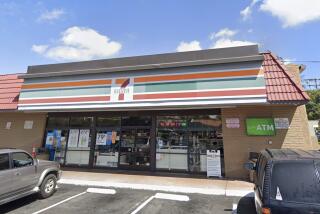Swap Meet Braces for Return of Looters Selling Stolen Goods
- Share via
Before the riot, Mee Cho, a merchant at the Alameda Swap Meet, had stocked up on jewelry and pocketbooks in anticipation of a brisk Mother’s Day business. But her forethought only heightened her loss.
When vandals looted the swap meet south of downtown 10 days ago, Cho lost $15,000 in merchandise. On Saturday, she braced for what she believes will soon happen--the day the thieves tote the goods back and try to sell them to her.
“They steal from us and they sell to us--I’m sure it’s going to happen,” said Cho, 30, a mother of two. “I wish this was over, but it’s not. It’s not safe. Home should be safe. You have to be comfortable in your home. But this is like a war. Do you want to live in a war zone?”
Cho, who left Korea at the age of 14, sees it as a war of race. It no longer, she feels, has much to do with Rodney G. King or the not guilty verdicts for the four officers who beat him that triggered the nation’s worst riots in this century. She caters to a Latino clientele by day; and at night, she is sick with worry about being looted by blacks.
Fortune teller Hermana Helena and the merchants--who are predominantly Korean and Korean-American--predicted Saturday at the swap meet that the violence is not over. Today’s quiet, they say, is merely the lull before the storm hits again.
While other residents have launched cleanup efforts, dozens of vendors here are bolstering their defenses.
The warehouse hosting the swap meet is pocked with bullet holes. The shop owners, mostly Korean, have been putting up corrugated metal over the broken windows, hoping to keep out Molotov cocktails. They erected scaffolding to reach the highest windows, lacing it with barbed wire so looters cannot break in.
After the first night of looting, they rented a big dumpster to block off the 4500 block of Staunton Avenue so looters couldn’t drive by the swap meet’s back entrance.
Every night, a group of male merchants, armed mostly with fire extinguishers, and security guards patrol the building. They still hear gunfire.
Most, like Cho, are accustomed to working 10-hour days with only one day off each week. But now, groups stay all night. One merchant who was worried about looters said he slept only two hours Friday night as he anxiously paced the swap meet. And then Saturday, he peddled his wares, mostly clothing.
In fact, many merchants agree with Cho: They say that when the inevitable comes to pass and the thieves try to unload stolen goods, they will not buy. Already several people have offered David King, a three-year veteran of the swap meet, clothing and shoes looted during the riot. But he declines.
“If we buy, they will bring again and again,” King said. “It’s a break in social order. It’s got to stop.”
Some Latino merchants and sales clerks agreed. Victoria Vasquez, 17, who sells jeans and shirts on weekends at the swap meet, said she had no interest in looted wares, few of which had trickled in so far. People may be too frightened to bring hot goods into the swap meet so soon after the riot, she said.
“You know by the look in their faces if they stole it,” said Vasquez, a high school sophomore. “I think they are going to come in here but they haven’t come yet.”
Latinos poured into the swap meet Saturday, an oasis offering goods in an area where many stores were looted. But, while mariachi and disco music were blaring, the merchants said it was still a quiet day. Many customers are staying away because of violence and the threat that it will continue.
“It’s not over yet,” said Hermana Helena, who offers spiritual counseling, palm reading, and advice on luck. “I feel that.”
Many feel edgy. And most believe the violence will resume, perhaps when the National Guard pulls out. Perhaps even sooner. But they also think the tensions, fueled by the riot, could erupt at any moment.
“There are a lot of gangs,” said Chun Pak, who has sold radios, car stereos and cameras at the swap meet for four years. “It’s not safe to come down here.”
Pak also worries about his supplies. Though he has enough wares to sell this week, his wholesaler was looted.
Dozens of merchants staff their booths at the swap meet, though several did not reopen because their shelves were emptied.
The swap meet was looted on the first night of the riot. Cho came in the next day and saw her jewelry case, cash register, and mirror smashed. Her shop was completely ransacked. Cho began to cry--she turned and walked out. She did not clean up that day. She felt sick with fear and anger.
Mother’s Day will not be the financial boon that Cho anticipated. Forced to borrow money from friends to reopen her shop, she will work all day while her children stay home with their father.
Before the riot, Cho said she didn’t think of herself as racist. Now, however, “maybe, I look (at a black man) and I have this feeling inside me that they hurt us so bad,” she said. Cho is struggling to make sense of the looting and the death of the Korean teen-ager who was killed as he tried to defend Koreatown. If she could move her husband and their two children to Canada, she would. But she cannot.
More to Read
Sign up for Essential California
The most important California stories and recommendations in your inbox every morning.
You may occasionally receive promotional content from the Los Angeles Times.













